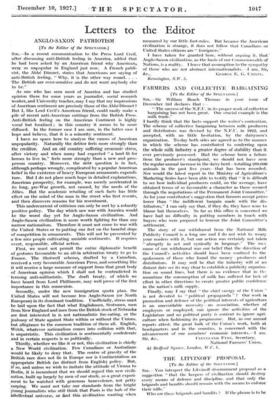FARMERS AND COLLECTIVE BARGAINING [To the Editor of the SPECTATOR.]
SIR,—Sir William Beach Thomas in your issue of December 3rd declares that :-- "The success of the N.F.U. in its proper work of collective bargaining has not been great. One crucial example is the milk trade."
I hardly think that the facts support the writer's contention. The scheme of collective bargaining between milk producers and distributors was devised by the N.F.U. in 1922, and accepted, with no little hesitation, by the dairymen's organization. To-day both sides are agreed as to the manner in which the scheme has contributed to conferring upon
the whole milk industry a greater degree of stability than it ever previously possessed. Had the scheme been a failure from the producer's standpoint, we should not have seen the regular annual increase in the dairy herd—totalling 269,000 animals in the past five years--that has been recorded. -Nor would the latest report in the Ministry of Agriculture's Marketing Series have been able to testify that "it is difficult to see how individual producers could, on the average, have obtained terms of so favourable a character as those secured through the negotiations of the Permanent Joint Committee." As for your contributor's suggestion that farmers accept prices lower than "the indifferent bargain made with the dis- tributors," I can only say that, if they do, they have none to blame but themselves. So far as this office is concerned we have had no difficulty in putting members in touch with buyers who were prepared to honour the Joint Committee's settlement.
The story of our withdrawal from the National Milk Publicity Council is a long one and I do not wish to weary your readers with it, but our action was certainly not taken "abruptly in act and cynically in language." The roc•I: cause of our withdrawal was our belief that the direction of the Council's activities should have been confined to the .spokesmen of those who found the money—producers and distributors. It may well be that the industry will at no distant date see its way clear to establish a publicity organiza- tion on sound lines, but there is no evidence that in tila meantime the consumption of milk has suffered for IS& of effort in other directions to create greater public confidence in the nation's milk supply.
Finally, may I say that "the chief energy of the Union " is not devoted to "political propaganda"? Our work in promotion and defence of the political interests of agriculture
is an unavoidable necessity-- no association, whether of employers or employed, can ignore the activities of the Legislature and no political party is content to ignore agri- culture when fashioning its programme. But, as our annual reports attest, the great bulk of the Union's work, both at headquarters and in the counties, is concerned with the advancement of our members' economic interests.—! am.
National Farmers' Union.
45 Bedford Square, London, W.C. 1.










































 Previous page
Previous page